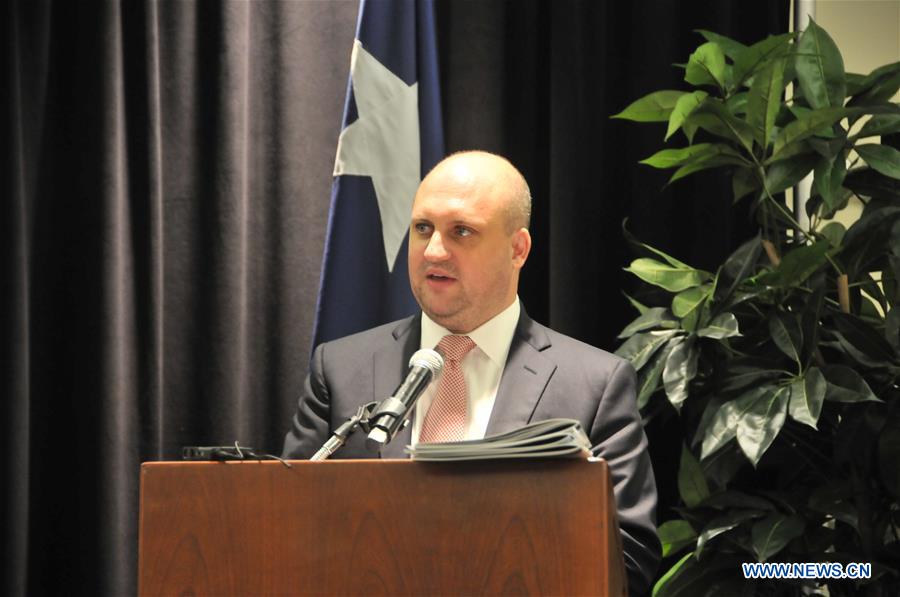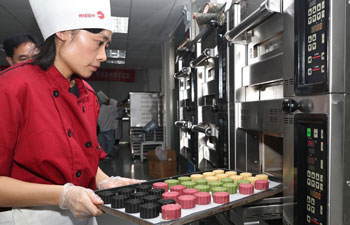
Bradley Hayes, executive director of trade relations for the U.S. Customs and Border Protection (CBP), gives the keynote remarks at the 25th Logistics & Manufacturing Symposium in Laredo, Texas of the U.S. Sept. 20, 2018. Better known for patrolling the border, apprehending illegal immigrants, seizing drugs and inspecting imports, Bradley Hayes wanted to get the word out that the agency is working to help the flow of trade. (Xinhua/Liu Liwei)
LAREDO, the United States, Sept. 22 (Xinhua) -- Better known for patrolling the border, apprehending illegal immigrants, seizing drugs and inspecting imports, a senior official with U.S. Customs and Border Protection (CBP) wants to get the word out that the agency is working to help the flow of trade.
Bradley Hayes, the executive director of trade relations for CBP, gave the keynote remarks at the 25th logistics & manufacturing symposium held recently in Laredo, a city built up along the border between the United States and Mexico.
He told the gathering that the tens of thousands of people who work for the agency have challenging "dual missions" of enforcing U.S. laws, but also of facilitating trade.
CBP officers processed more than 11 million maritime containers, checked 10 million containers coming into the United States by truck and three million rail containers in fiscal 2017, according to Hayes.
"With those numbers in mind it's important to remember CBP must constantly balance the dual missions, and sometimes they seem contradictory, of trade enforcement and trade facilitation," he said.
Also needing monitoring were the millions of postal and express packages being delivered to U.S. homes and businesses from foreign countries, many of those packages being ordered online by U.S. citizens from overseas companies. "Those numbers are astronomical," Hayes said.
Complicating CBP's work is the explosion in e-commerce, which is increasingly changing how people shop for products. Instead of heading out to local stores, consumers now search for virtually anything almost anywhere in the world and order it with the click of a few buttons.
With this global online market available to U.S. consumers, the U.S. Department of Commerce reported earlier this year that about half of all the goods and services shipped between the United States and Canada or Mexico were ordered over the internet. Meanwhile, separate reports noted the explosion of China's e-commerce industry, with Chinese manufacturers shipping billions of dollars worth of goods around the world, including into the United States.
"To be blunt, it's changed everything," Hayes said of the booming e-commerce business.
"The number of Americans shopping online has nearly quadrupled since 2000, from around 22 percent to an estimated 79 percent of the population," he said. "We can do it on our phones, we can do it on our iPads, we can do it on our laptops, we can do it wherever."
As one of the world's largest law enforcement agencies, CBP protects the U.S. border, guards against terrorism and intercepts drug shipments. Created in 2003, the federal agency combined several different agencies -- including the U.S. Border Patrol -- which had a wide range of responsibilities from border enforcement, to assuring the quality of meat and poultry, to inspecting and collecting duties and tariffs on goods imported into the United States.
As the Trump administration directs the CBP to focus on its law enforcement mission, the approximately 60,000 men and women who work for the agency sometimes find their responsibilities in conflict.
"We have to walk the line to make sure we keep these a priority while making sure trade flows freely and allows the economy to continue to flourish," Hayes said.











